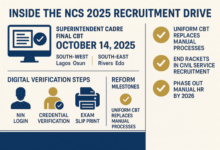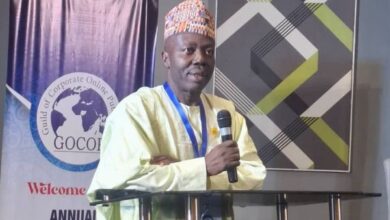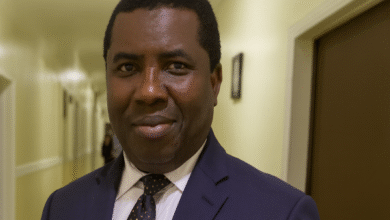Revenue agency: FIRS, fails to meet 2016 target
 Despite a marching order handed out to it by finance minister, Kemi Adeosun, the Federal Inland Revenue Service, FIRS, could not meet its revenue target for 2016, according to PREMIUM TIMES report.
Despite a marching order handed out to it by finance minister, Kemi Adeosun, the Federal Inland Revenue Service, FIRS, could not meet its revenue target for 2016, according to PREMIUM TIMES report.
Findings revealed that out of its N4.957 trillion tax target for 2016, the agency only generated N3.303 trillion.
While speaking at the second day of the 2016 Annual Corporate Strategy Retreat of the FIRS in February 2016, Mrs. Adeosun had handed out a marching order to the agency, adding that there was no room for failure over its N4.957 trillion tax target for 2016.
“There is really no room for failure. Really, there is no room for failure. Please ensure you deliver. The nation will depend on FIRS to fund the budget. We need the money to stabilise the economy,” she had said.
“In addition to your professional pride, and the satisfaction you may derive from working for FIRS as a professional, please note that you are also building the nation by realising the target and by being professional, honest and dedicated in the way you do your work. This is what the nation needs now.
“This is not a joke. We need everybody to do his/her bit to ensure that everybody contributes to the achievement of the target. I look forward to the excellent ideas that will improve revenue generation as you proceed in this retreat.”
A release signed by Wahab Gbadamosi, the agency’sspokesperson, added that the minister also underscored the importance of FIRS’ attainment of its 2016 target of N4.957 trillion to the Federal Government, noting that the fund was necessary for the funding of the budget.
Reacting to Mrs. Adeosun’s marching order at the retreat, Tunde Fowler, the then newly appointed chairman of the agency, said, “I am particularly not pleased with the very poor VAT collection, which based on my previous experience at the state level in the administration of a tax similar to VAT, should be a high yield and easy to collect tax.”
Facts however revealed that the agency couldn’t meet the N4.957 trillion target set for the year, which, according to Mrs. Adeosun, was needed to stabilize the economy.
While speaking on Tuesday at the breakfast meeting of PEDABO, a tax, audit and advisory firm, Mr. Fowler said the agency netted N3.303 trillion in 2016. He spoke as a guest speaker at the event which held at the Civic Towers, Victoria Island, Lagos.
It was revealed that between 2000 and 2014, the agency only failed to meet its target once, in 2006, as it recorded N1,866.2 trillion out of a projected target of N3,054.1 trillion for that year.
In 2000, with a target of N380.5 billion, the agency netted N455.3 billion; in 2001, with N500.7 billion as its target, it netted N586.6 billion; and in 2002, it generated N433.9 with a target of N396.2 billion.
In 2003, it netted N703.1 billion N572.9 billion despite a target of N572.9 billion; N1,194.8 trillion with a target of N800 billion in 2004; N1,741.8 trillion with a target of N1,304.4 trillion in 2005; and N1,846.9 trillion with a target of N1,753.3 trillion in 2007.
In 2008, FIRS netted N2,972.2 trillion despite a lower target of N2,274.4 trillion; N2,197.6 trillion with a target of N1,909.0 in 2009; and N2,839.3 trillion with a target of N2,557.3 trillion in 2010. Also in 2011, it generated N4,628.5 trillion, a figure higher than its target of N3,639.1 trillion; and in 2012, it netted N5,007.7 trillion while it target was placed at N3,635.5 trillion.
In the same vein, with a revenue target of N4,468.9 trillion in 2013, the agency generated N4, 805.6 trillion while it netted N4, 714.6 trillion in 2014, with a revenue target of N4,086.1 trillion.
But further checks by this newspaper revealed that apart from 2006 and 2016, the agency also failed to meet its revenue target in 2015, as it netted N3, 741.8 trillion out of a projected target of N4,572.2 trillion.
When contacted Thursday afternoon, Wahab Gbadamosi, the agency’s spokesperson, said the inability of the FIRS to meet its projected target reflects the general state of the Nigerian economy. Mr. Gbadamosi noted that the crash in oil prices also affected the revenue drive of the agency, adding that oil drives the nation’s economy.
He explained that between 2012 and 2014, oil sold on the average of 100.19 and 108.7 USD per barrel but the crash, which affected companies’ income generation source especially in 2016, had its toll on the revenue drive of the agency too.
“Oil drives the economy from banking, to insurance, to energy, to transport…name it. It is what drives the economy.
“And tax is based on income generated. If (Nigerian) companies are not generating income, we cannot tax them.”











